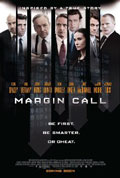
Directed by
J C Chandor
110 minutes
Rated MA
Reviewed by
Sharon Hurst

Margin Call
Synopsis: One morning in 2008, one third of the employees of an unnamed US investment bank are summarily dismissed. One of them is Eric Dale (Stanley Tucci), a senior risk analyst who has been working on some troubling figures. As he leaves, he hands his research to his colleague, Pete Sullivan (Zachary Quinto). Alarmed, Pete notifies his boss Will (Paul Bettany) and eventually the firm senior execs are assembled to hear the news that major trouble is afoot. Company heavyweights Sam Rogers (Kevin Spacey), Sarah Robertson (Demi Moore), Jared Cohen (Simon Baker), and CEO John Tuld (Jeremy Irons) begin making decisions that will be a harbinger of the global financial crisis to come.
You don’t have to be a finance boffin to experience the intense and thrilling tension of this excellent first feature from writer/director J.C.Chandor who lost out to Woody Allen for Best Original Screenplay in this year’s Oscars.
The splendid ensemble cast have also received several nominations at various film awards, and justifiably so. CEO Tuld, played remarkably by Irons, is the epitome of the untramelled self-interest that so many heads of such companies exhibit. All is done to save their own skins, regardless of who is burned on the way. Irons performance is mesmerising – suave, elegant, manipulative, and domineering. Tucci also impresses – embodying so many conflicting emotions and motivations and giving one of the best performances I’ve seen from him. In fact every cast member, including the two main women, Demi Moore and Mary McDonnell as Eric’s wife, are superb.
There have been several excellent films dealing with the 2008 financial crisis. The doco Inside Job examined the dangerous cross-over between politics and finance, The Company Men looked at the effect on working men’s lives. Margin Call examines the profiteering mentality of the financial industry. Our introduction to the milieu is the hard-nosed women who deliver the bad news to Eric. They are blunt, ruthless and seemingly lacking in any compassion. We then meet the aspirational young traders, Pete and his friend and colleague, Seth (Penn Badgley), initially spared in the bloodbath of redundancies, who endlessly discuss how much money can be earned in the industry.
As the stark reality of the impending debacle sinks in, the immorality of the decision-making is fore-grounded. The junior employees blindly do as they are instructed – lured by the promise of a big bonus. Although there is plenty of fiscal terminology bandied around one doesn’t have to necessarily understand it all to understand the mounting drama. The genius of the script lies in the absolute believability of the chain of events and of the characters caught up in them. Nothing is overdramatised, yet what happens is high drama.
Cinematographer Frank G de Marco makes wonderful use of the Manhattan locations. The sleekly sanitized, artificially-lit interiors reinforce the gap between Wall Street and the real world and the skyscraper views serve to trigger in our minds all the symbolic associations of a financial crash – from the initial views from above to the eventual precipitous fall to below. The final scene with Kevin Spacey (who gives a truly compelling performance) adds a touch of poignancy to a story that will haunt our world for decades to come, until, no doubt, human nature being what it is, it repeats itself.

Want more about this film?


Want something different?




